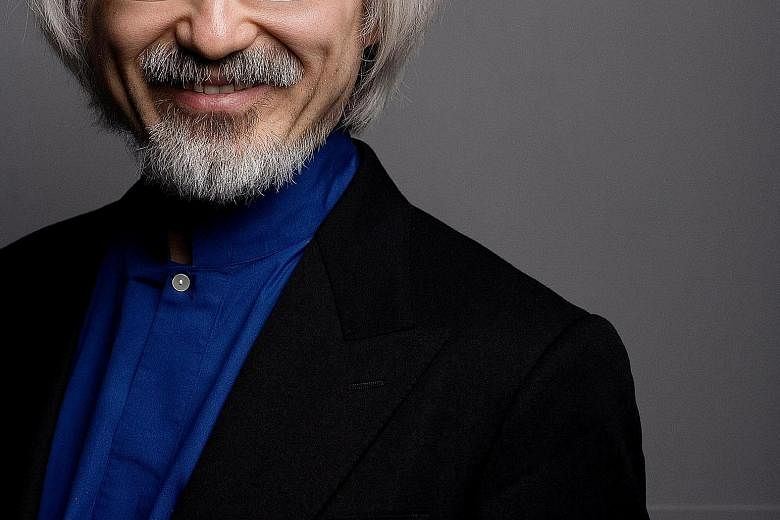Japanese conductor, harpsichordist and organist Masaaki Suzuki, 61, has been described as "the world's greatest Bach conductor" (by American newspaper New Haven Advocate), and earned plaudits from The New York Times for "a subtle ear for colour, a keen sense of harmonic direction".
The founder and musical director of the Bach Collegium Japan, an orchestra and chorus specialising in baroque music, returns to Singapore for his first concert with the Singapore Symphony Orchestra (SSO), where he will also be conducting his organist son, Masato Suzuki, 34.
Their programme includes C.P.E. Bach's Sinfonia In D Major and Poulenc's Concerto For Organ, Timpani And Strings In G Minor, as well as Beethoven's Symphony No. 2 In D Major.
Suzuki recently spoke to Life over the telephone from Tokyo where he lives and works.
-
BOOK IT/MASAAKI & MASATO SUZUKI WITH THE SSO
Where: Victoria Concert Hall
When: Thursday and Friday, 7.30pm
Admission: $20 to $72 from Sistic (call 6348-5555 or go to www.sistic.com.sg)
What do you usually do immediately before a concert to get yourself mentally prepared?
I've been using this breathing technique developed by Kozo Nishino, who is now quite old. He used to be a dancer and a doctor and he developed a very interesting exercise on how to train yourself - not only physically, but also mentally.
What I do before the concert is just basic exercises. I breathe in and out while bending my body. Sometimes I lie on the floor and do some stretching. We develop ourselves inside, mentally, and that gets our body released from anger or anxiety.
I need just 10 minutes in my dressing room where I do this sort of exercises. It doesn't look so special, but it's important for me.
What is your approach to working with an orchestra that you've never conducted before?
I try to make clear my habits or my interpretation of the works and sometimes I need to explain, but during rehearsals, we can get to know each other very quickly.
I haven't heard the SSO live, but I have heard them on recordings and video clips. I have heard very, very good reviews and I'm looking forward to it.
What do you do when someone in the orchestra or the choir gets a note wrong or makes a mistake?
Sometimes you don't have to be very critical. Mistakes are mistakes and that's no problem.
Sometimes, there might be a misunderstanding of what I want. If there's any difference between my interpretation and their habits in playing the piece, sometimes I need to correct it or I need to ask them to do something different. But that's the exception.
After a really intense concert, what do you like to do to relax or unwind?
I need to drink wine or beer - usually more wine than beer (laughs) - and I need to talk with a friend or sometimes an orchestra member or the audience. It's a really wonderful moment. It's definitely my favourite moment, right after the concert.
If there's a good restaurant, I will go. In Singapore, I have no worries at all because there's good food everywhere.
You started playing the organ for your church congregation at age 12. What made you fall in love with the instrument?
The sound of the organ depends very much on the quality of the instrument. At that time in Japan, there weren't many good instruments, but I was fascinated with it.
When I was a middle school boy, I had so many dreams about how a real organ would sound like. Some years later, when I went to the Netherlands for the first time, I was really shocked and excited. I couldn't stop myself from going to churches to listen to the organ every day. It was an amazing thing for me.
Since then, I have probably corrected my memory of the organ's sound. (laughs)
The organ is a really machine-like instrument. I think it has the strongest character and it is the farthest thing from Japanese traditional music. There is no keyboard instrument in Japanese traditional music and no polyphony.
So the organ was really removed from the original culture that I grew up in. It's probably this remoteness that made me more fascinated.
What is it like to conduct and work with your son Masato?
He has been playing in my ensemble for almost 10 years - sometimes in the ensemble, sometimes as a soloist. He also conducts now. We have worked on quite a few things together.
It is very nice to work with him. Sometimes we are asked how we feel to be working as father and son. Sometimes it is difficult, of course. In general, we know very much - sometimes too much - about what we feel about each other. (laughs)
I've never forced him to do music, but I think he naturally developed in the same direction. Obviously he has a different character and completely different taste from me. He is much more cool.
He has been analysing what I have been doing for a long time, so he knows everything - what is good and what is bad. The starting point of his career was actually what I took to achieve in 20 or 30 years.


